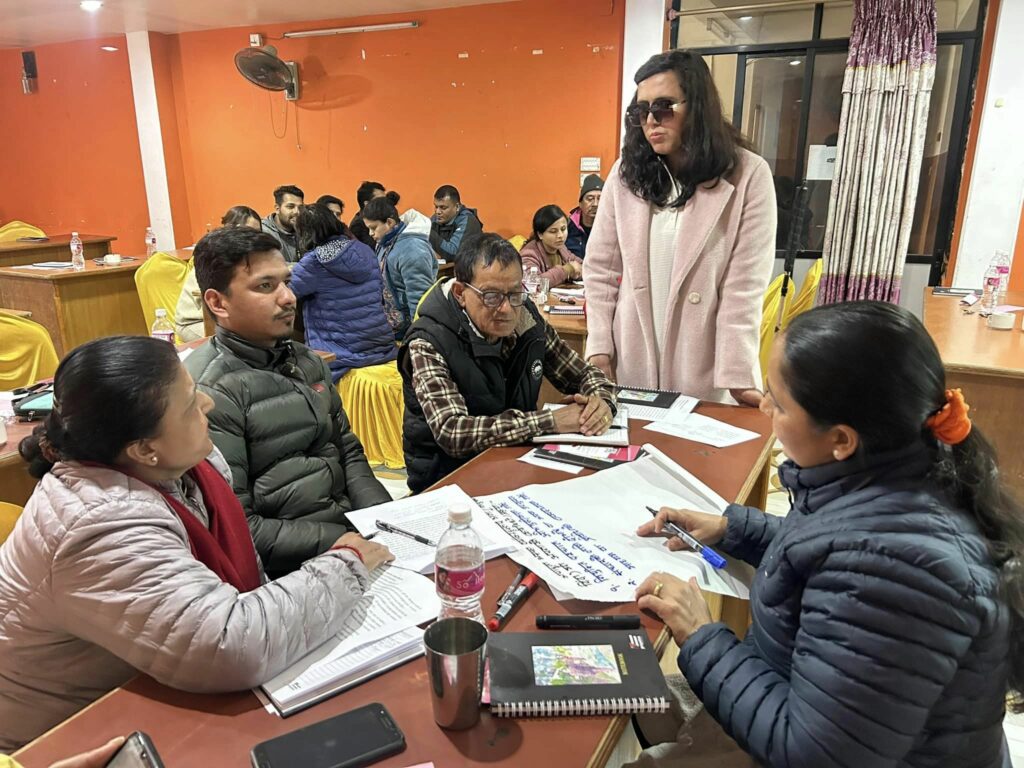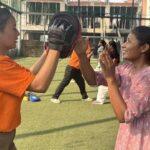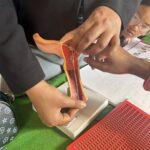
Prayatna Nepal is the self-help organization which is working continuously to empower the living condition of women and girls with visual impairment. The organization is established by the group of both women with and without visual impairment. Among the seven board members, five (71%) are with visual impairment, including the chairperson. The idea of inclusion of women with and without disabilities in the organization is to make equal efforts from every individual with better understanding to improve the social, cultural, economic, environmental, and political life of women with visual impairment. The program was commenced with the introduction of Prayatna Nepal where the Impact Video of Prayatna Nepal was played. After that, Ms. Sarita Lamichhane (Chairperson of Prayatna Nepal) welcomed and encouraged all the participants to give their short introduction. She then initiated the session by engaging the participants in discussion, where they were asked to share their understanding of disability. After this, she explained about models of disability. She briefed on changes in viewing disability with time. She explained that there are basically four changes: i. First, persons with disabilities were seen with pity and they need to be helped with charity (Welfare Model), ii. Later, it was believed that disability is a deform which can be treated through medical procedures (Medical Model), iii. Then, people started looking at disabilities through social welfare lenses whereby they believed that persons with disabilities should be supported by the society (Social Model), iii. Now, people have shifted their perception into being more human rights sensitive and believing that persons with disability are humans and should be treated equally like everyone else with more meaningful participative approach (Human Rights-based Model). However, when the participants were asked to relate this modality with present situation in Nepal, most of the participants believed that Nepal is still somewhere between Medical and Social Model. After this, Mr. Shishir Khanal (Secretary of National Association of the Blind) proceeded with his session on concept of disability, where he shared international and national definitions of disability and types of disability on the basis functional limitation and severity. In this session he talked about the ten different types of disability that have been recognized/categorized in Nepal and further explained about four categories of disability based on severity (disability card/color) and its related provisions by Nepal government. He also asked the participants to share their thoughts.
After this session, Ms. Sarita Lamichhane took over the next session on how disability inclusion can be considered by the organizations. For this, she used a method of game where she gave some statements highlighting the issues and concerns of disability in relation to the participants’ respective organizations. The game was a way to help the participants self-evaluate and realize to what extent they and the organizations they represent are disability inclusive. After this game, she further explained about the use of respectful language and some etiquette that should be considered while approaching, communicating with, and documenting about persons with disabilities. She then took a session on Community Based Rehabilitation (CBR) and Community Based Inclusive Development (CBID), where she explained about the evolution of CBR into CBID at the present. She also further focused the discussion on the key principles of CBID and how it can be achieved. She highlighted the importance of reasonable accommodation and meaningful participation that ensures inclusion. She also encouraged open discussion among the participants on how CBID can be applied in our projects/programs or what are the tools of CBID that legally compels us to consider disability inclusion in our works. Not only that, but she also highlighted the role of organizational policies, knowledge on accessibility, good governance and proper management within the organization that ensures inclusive and meaningful participation of persons with disabilities. Ms. Sarita also explained about physical and digital accessibility, where she highlighted that being disability inclusive means focusing on accessibility and reasonable accommodation not only through the lens of infrastructural development but also in the digital world. She promoted considering the Web Content Accessibility Guidelines (WCAG) while developing, maintaining, and updating information on websites or any social media platforms. The WCAG are part of a series of web accessibility guidelines published by the Web Accessibility Initiative of the World Wide Web Consortium, the main international standards organization for the Internet. After this, she briefly explained on understanding Barriers in Disability Inclusion through ACAP Framework and ways forward. In this session, Ms. Sarita highlighted the ACAP framework, whereby A means Attitude, C means Communication, A means Access and P means Participation. This means cultivating positive attitudes towards individuals with disabilities, ensuring effective and inclusive communication strategies, providing accessible physical spaces and digital platforms, and actively involving people with disabilities in various aspects of the organization's activities. She also introduced ways forward in an interesting way whereby she defined it in Alphabet A to G. Through this creative approach, she encouraged the participants be disability inclusive by Adopting Pragmatic Policies, Bridging Interaction and Communication Gap, Conducting Regular Awareness and Sensitizing Training, Developing Monitoring and Review Mechanisms, Encouraging Participation and Embrace Accessibility, Following These Steps, Gearing Up for True and Sustainable Inclusion. In this session, she engaged the participants in group discussion where the participants presented the application of ACAP framework in opening job vacancies, staff recruitment/selection process, project and program planning, budgeting and its implementation. After this, Ms. Sarita opened the floor to the participants for questions and discussions, where participants openly expressed the benefits as well as importance of attending such workshop to reflect on their work in relation to disability inclusion, which they mostly know but haven’t really considered as important until today.
After open discussions, we took feedback from each participant. The participants expressed their gratitude towards Prayatna Nepal team and suggested to provide such trainings to as many representatives of different organizations as well as government stakeholders. We also took commitment from each participant to ensure the application of learning from this workshop into actual their work and organization.



